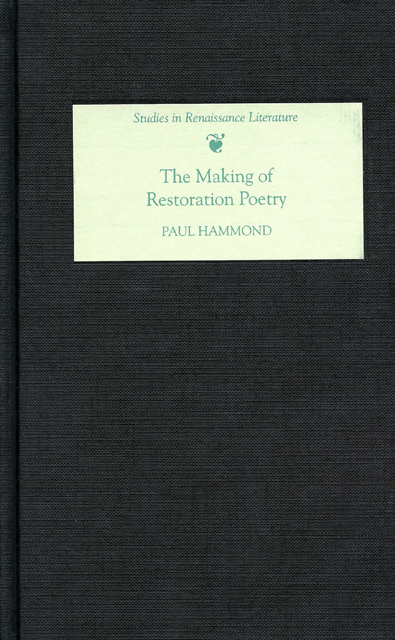5 - Classical Texts: Translations and Transformations
Published online by Cambridge University Press: 18 March 2023
Summary
IN WHAT respects is Andrew Marvell's ‘Horatian Ode’ an Horatian ode? Marvell and his contemporaries gathered their ideas of Horace and of Horatian odes from a variety of sources. They would have read the Latin text of Horace's poetry in editions which surrounded it with glosses, notes, parallel passages, and perhaps a prose paraphrase; they would have practised translating and imitating Horace's poetry at school; they would have read English translations and imitations of Horace by writers such as Jonson or Milton. Horace, therefore, was already a complex text for readers of Marvell's poem, a text which they fashioned for themselves out of all these interpretative materials. Horace's odes spoke of private and domestic experiences – love and desire, both homosexual and heterosexual; friendship and the pleasures of conviviality; the passage of time and the poignant delight which may attend an awareness of life's passing. The poetry also spoke of the great public events which were shaping Rome under Augustus, though often addressing such matters at a tangent, cautious about how a private citizen might speak to power or understand history, and jealous of the poet's precarious independence. It was perhaps with a teasingly deliberate naivety that Horace wrote:
Integer vitae scelerisque purus
Non eget Mauris iaculis, neque arcu
Nec venenatis grauida sagittis
Fusce pharetra.
Vertue, Dear Friend, needs no defence,
The surest Guard is innocence;
None knew till Guilt created Fear
What Darts or poyson’d Arrows were.
For many seventeenth-century poets and readers, virtue was to be sought in innocent pastoral retirement, and this ideal was often imagined through material taken from Horace, notably his Epode II on the delights of country life. But virtue does need defence in a period of civil upheaval such as both Horace and Marvell experienced; and much as Horace might praise the delights of the retired life on his Sabine farm, there might be times when retirement itself was no longer a virtue. And so,
The forward youth that would appear
Must now forsake his Muses dear,
Nor in the shadows sing
His numbers languishing:
‘Tis time to leave the books in dust,
And oil th’unusèd armour's rust;
Removing from the wall
The corslet of the hall.
As readers pondered the significance of Marvell's invocation of Horace, they would recognize certain features of the ode as approximating to Horace's methods.
- Type
- Chapter
- Information
- The Making of Restoration Poetry , pp. 89 - 106Publisher: Boydell & BrewerPrint publication year: 2006



